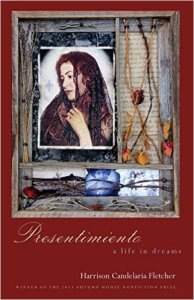 Harrison Candelaria Fletcher’s second memoir follows Descanso For My Father: Fragments Of A Life, which won the Colorado Book Award for Creative Nonfiction and International Book Award for Best New Nonfiction. Turning now to his mother’s story, Fletcher opens Presentimiento: A Life in Dreams with a trip back to Albuquerque after nearly a decade away from his native New Mexico.
Harrison Candelaria Fletcher’s second memoir follows Descanso For My Father: Fragments Of A Life, which won the Colorado Book Award for Creative Nonfiction and International Book Award for Best New Nonfiction. Turning now to his mother’s story, Fletcher opens Presentimiento: A Life in Dreams with a trip back to Albuquerque after nearly a decade away from his native New Mexico.
Half expecting to find his mother’s home exactly as he remembers with “Navajo rugs, prayer poles, peacock feathers, Cochiti drums,” he discovers instead “displays of porcelain saints, rosary beads, gilded lamps, and crucifixes.” After having open-heart surgery, his mother stripped her room bare of casual decorations and outfitted it with “the aura of a chapel, complete with flickering candles and a creaky wooden floor.” The ambience is ripe for recollecting, and every phrase and anecdote Fletcher gathers shines with the intimacy of worry stones and desert roots he and his mother pocket on visits to gravesites, former dwellings, and other family landmarks.
His noun-thick prose is laden with sensory detail. “In the amber glow of a desk lamp, I read my mother’s walls,” he says: “Hammer head. Weather vane. Hatpin. Holster…As a boy, this was the world I inhabited—image, artifact, fragment, negative space.” Thus, he understands how what he leaves out, such as any interpretation of her memory boxes’ contents, best reveals the objects in themselves and the kind of person who treasures them. He presents, like a rare antique store find, the “nickel-plated hope chest [his] mother bought in the ‘70s from a widow in the hills above Cuba, New Mexico.” The original owner had shrugged off the container that once held her dowry and offered it to its admirer as a gift. Opting instead of receiving it for free to pay the fifty dollars she intended for the light bill, his artist mother reveals her core character. Her son’s character in turn filters through his recognition of what matters most to her, as he gestures to preserve the stories that animate her belongings.
Negative space allows air to circulate between many paragraphs, which are separated by enough white space that some sections in the book appear like poems. This layout makes legendary their family stories. In a passage titled “…the Weight,” for example, Fletcher relays a night when his mother and her three youngest sisters, as girls, lay awake in bed giggling. When a boot step makes its way down the hall toward them, they cover their heads with the sheet and hold their breath. Thinking the heavy weight that sinks into the mattress with a sigh to be another family member, they pull back the covers horrified to find nothing there. That so much remains unsaid in this eight-line story adds to its mythic quality.
But what I appreciate most in Presentimiento is that reminder of “something you feel in your heart,” which people relied on for centuries before telephones to communicate. The sense of connection that presentiment fosters recalls the gift Rebecca McClanahan created by braiding her family narrative into The Tribal Knot: A Memoir of Family, Community, and a Century of Change. Both collections ask readers what they might pull back from the edge of the river of forgetting and what we can learn from places and people that are “fading, if not being outright destroyed.”
My mother leaning on tiptoe to pick a yellow Lodi apple boomerangs to me when he describes his mother’s pleasure to taste again the manzanitas de San Juan. The same bolt of lightning flashed through the viewfinder of her Brownie camera as his mother’s. “Look at them. Just look at them,” she tells him of the saints before the altar at the church of Las Trampas. And look he does, swaddling what he sees in language as vivid as the dyed-oxblood huarachas that gave his mother her first glimpse of glamour, and in turn puts their family culture in a context by which readers might celebrate difference.
___
Amy Wright is the author of Everything in the Universe and Cracker Sonnets, both forthcoming in 2016. She is also the nonfiction editor of Zone 3 Press, coordinator of creative writing and associate professor at Austin Peay State University, and author of four poetry chapbooks. Her first prose chapbook, Wherever the Land Is, is scheduled for release this spring.
